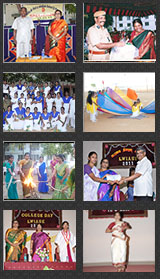PREFACE
Lady Willingdon Institute of Advanced Study in Education is situated on Kamarajar Salai, Triplicane, Chennai – 600 005, just 3kms from the Fort St. George, the head quarters of Government of Tamilnadu. In the year 1922, this Institute of Teacher Training was named ‘Lady Willingdon Training School’ after ‘Lady Willingdon’ wife of Lord Willingdon, then Governor of Madras Presidency.
The pioneer Principal Miss. J.M. Gerrard, had a vision of stately edifice, facing the sea, shaped like ‘W’. Her vision materialized when a Scottish architect, under her guidance designed the present building into which the college moved in 1940.
The majestic building in the premises of 16 acres overlook the world famous sprawling Marina Beach beside the Bay of Bengal, which is one of the longest and beautiful beaches of the world indeed.
To its north, just a few meters away, lie the Guest House of the University of Madras, the beautiful palatial building of the Presidency College, the P.W.D. building and the famous Madras University; to its south, the Queen Mary’s College, the office of the Director General of Police, the All India Radio Station and the historical Santhome Cathedral Church are situated.
It is easily accessible by road and also by railways through M.R.T.S.
GROWTH AND DEVELOPMENT
In 1922-24 the first batch of 23 women graduate teachers were presented
to the Licentiate in teaching examination of the Madras University and they
obtained the L.T. Degree.
Initially the college offered two levels of teacher training programmes for
women viz.,
1. Licentiate in Teaching for graduate
2. Secondary Grade Teacher Training for post-metric students and
elementary Grade Teacher Training for those who completed the school
course.
In 1941, the L.T. Degree was replaced by the B.T. Degree (Bachelor of Training). From the year 1972-73 B.T. Degree was replaced by B.Ed. Degree.
From 1964-99 Tamil Pandit Course was functional. In 1972 M.Ed. course was started as Evening College course which was converted into regular course in
1981. In 1991 the Lady Willingdon College of Education was upgraded and renamed as ‘Lady Willingdon Institute of Advanced Study in Education’.
From 1998-99 M.Phil. in Education both full time and part time courses were started. In 2000, Lady Willingdon Institute of Advanced Study in Education
was the ‘FIRST’ Government Institution to be accredited at the level of FIVE STARS by National Assessment and Accreditation Council (NAAC). Lady Willingdon Institute of Advanced Study in Education celebrated its Golden Jubilee, Diamond Jubilee and Platinum Jubilee in the year 1972, 1983 and 1999 respectively.
The College was granted Autonomous status by the UGC on 5.07.2006. The college was accredited B++ level by National Assessment and Accreditation
Council (NAAC) in the year 31.03.2007. The College is affiliated to Tamilnadu Teachers Education University from the year 2008.
OUR VISION & MISSION
VISION- To disseminate world of knowledge vividly and interestingly to cause intrinsic motivation.
- To identify talents and channelise appropriately for individual growth and national development using technology.
- To inculcate resourcefulness in depth through teaching following psychological principles.
- To instill the quality of nobility associated with the teaching profession.
- To authentify that learning leads to heights of excellence.
- Well qualified and Experienced staff members
- Many staff members are pursuing projects funded by UGC
- Meritorious students
- Good infrastructural facilities
- School training in the Government schools
- Pleasant environment
- Many Ph.D Scholars are awarded with scholarships from State Government, UGC and ICSSR.
- Lot of vacant positions both in teaching and non teaching posts.
- Usage of campus as playground by the general public.
GOALS & OBJECTIVIES:
- To develop the total personality of the teacher trainees, to meet the challenges in the field of education.
- To enable the teacher trainees to become creative and innovative in pedagogy.
- To equip the trainees in communication skills to become interested in life long learning
- To become aware of concepts in educational psychology to deal effectively with behavioural problem of the learners.
- To implement the knowledge of psychological principles and theories in the teaching learning process.
- To inculcate commitment to national development.
- To function efficiently as a role model, to impart values.

